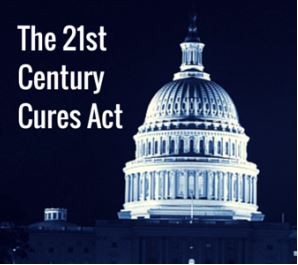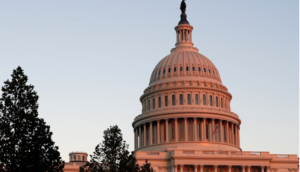- Hospital Impact: Drug companies win, patient safety loses with 21st Century Cures Act (fiercehealthcare.com)
The 21st Century Cures Act passed the House and Senate with overwhelming bipartisan support and has now been signed into law...On its surface, there seems to be little controversy in supporting more funding to the National Institutes of Health for innovative research, more expeditious approval of promising drugs by the Federal Drug Administration, and better approaches to combat the opioid abuse epidemic...However, there are a number of troubling provisions in this potential law of which the public should be aware...To outline the advantages and concerns, I created a series of winners and losers from which readers can draw their own conclusions:
- Winners
Drug companies: It shouldn’t surprise anyone that the pharmaceutical industry is ecstatic over the law, as the bar for approval of drugs under development is made significantly lower by reducing the rigor required for approval of new drugs by the FDA. Traditionally, rigorous double-blinded peer review studies are required prior to consideration and approval. - Losers
The FDA: Already stymied with deteriorating labs, under staffing and somewhat compromised approval processes for new drugs and medical devices, the FDA is not expected to fare better under the new law...Lowering the bar for the rapid and expeditious approval of pharmaceutical and medical device products with expansion of off label uses will only further undermine the FDA’s ability to protect the public from potential harm...Evidence-based medicine: The law allows for the use of “real-world evidence”—which may include anecdotal studies or observations, patient or professional opinion, as well as non-validated or scientifically measured outcomes—to justify the approval of a new treatment product...pharmaceutical companies will only be required to submit a “data summary” for new pharmacological agents or new indications to existing products, which will make the introduction of new products far easier.
- Winners
- Experts urge better staffing, more funding to begin to fix Nevada’s mental health programs (reviewjournal.com)

Angela Beck, director of the Behavioral Health Research Center at the University of Michigan at UNLV
Experts from across the valley have taken a hard look at both the city and state’s mental health care situation, and most agreed that, in order to fix things, it will take time, new professionals and lots of money...Nevada has the fewest clinicians of any state — that’s providers who can sit with you and know what to do. In Nevada, only one in three adults that has mental illness will be able to get help. Only one in two children who have severe mental illness can get any help. There’s not enough of us to go around....the shortage of professionals is the root of many of the problems...part of that is infighting between various designations of health care professionals, which ultimately leads to state licensing complications...We don’t have enough professionals, and when professionals try to move here from out of state, we don’t certify them so they can get to work...positive sign that the Nevada Legislature is discussing collapsing all of the licensing boards — for anything to do with behavioral health — into one entity...our system is so poor that most professionals are celebrating this. We believe it will streamline the system, provide resources and bring professionals into the field...
- Big Pharma Spends Millions to Keep Prices High for California Agencies (thestreet.com)
California's attempt to curb drug prices, Proposition 61, could cause drug companies including Merck, Pfizer and Johnson & Johnson to raise prices, according to analysts, and the companies are already taken steps to block the bill's passage…According to analyst David Larsen...the major drug companies could choose to extend the prices they offer to the Department of Veterans Affairs to the state, while offsetting the discounts by raising the prices of other drugs...drug companies could risk a domino effect of having to discount other states...manufacturers could raise the prices they offer to the VA, which was threatened in 1992 when Congress considered doing something similar on a federal level...While drug companies stand to benefit politically from opposing this bill, they likely won't see an impact on their bottom lines if Proposition 61 passes - at least at first...Prop 61 addresses such a narrow portion of the California population - state agencies and non MCO Medi-Cal, the revenue and earnings exposure for the distributors and PBMs is minimal...likely that California's legislature will realize that companies can raise prices elsewhere, and will ultimately repeal the ballot measure.
- Most Californians support a measure to obtain state discounts on drugs (statnews.com)
The pharmaceutical industry may be losing a heated battle over drug prices in California...A poll released earlier this week found that two-thirds of Californians support an initiative that would require drug makers to offers discounts to state health programs…At issue is the California Drug Price Relief Act (Proposition 61), which would revise state law to require the state Medicaid program, which is known as Medi-Cal, and other state programs to pay no more for medicines than the prices negotiated by the US Department of Veterans Affairs. Currently, the VA gets a 24 percent discount off average manufacturer prices...The measure is being closely watched as a litmus test for public discontent over prescription drug costs and the extent to which such efforts may crop up in other states, a point of great importance to drug makers. So far, the only state where a similar initiative is being organized is Ohio...California is often seen as a bellwether state for political trends and voter attitudes...
- House Just Passed the Biggest Health Reform Bill Since Obamacare (fortune.com)
The House of Representatives on Wednesday night overwhelmingly passed wide-ranging legislation meant to overhaul the drug approval process, boost biomedical research, and many other significant health-related policies. The so-called 21st Century Cures Act was approved on a 392-26 vote and will head to the Senate for consideration next week...The bill aims to speed up the approval for drugs and medical devices through a variety of tweaks to the Food and Drug Administration. But it also encompasses a host of other big initiatives, including more than $5 billion in funding for the National Institutes of Health and money to help the FDA; $1 billion for tackling the opioid epidemic; and provisions that are meant to help pair Americans who suffer from serious mental illnesses with available psychiatric beds...
- Californians can sock it to ‘greedy’ pharma. But will ballot vote bring down drug prices? (statnews.com)
As Americans grapple with the rising cost of medicines, a contentious ballot measure in California is being billed as a fix to an intractable national problem...Known as Proposition 61, the proposal would require state agencies to pay no more for prescription drugs than the Department of Veteran Affairs, which receives a federally mandated 24 percent discount from manufacturers. In theory, that would lower drug costs for up to 7 million residents of California who get insurance coverage for their medicines through various state agencies, including low-income residents on the state version of Medicaid...the measure has merits and flaws. Ultimately, the California Drug Price Relief Act is a well-intentioned proposal that clearly sends a strong message to the pharmaceutical industry — but the details should also give us pause...Prop 61 is imperfect and, ideally, pricing should be addressed on a national level. But the measure sends a needed message that the status quo is unsustainable. Until the pharmaceutical industry recognizes this sad reality, there will be more — and better — propositions before voters...
- California senator withdraws ‘gutted’ drug price transparency bill (statnews.com)
A closely watched effort in California to pass a bill that would require drug makers to explain their price hikes has been scuttled. The decision came after amendments were made during an assembly committee hearing last Friday that sources told us "effectively gutted" the legislation...The bill would have required drug makers to report any move to increase the list price of a medicine by more than 10 percent during any 12-month period. And drug makers would also have had to justify price hikes for medicines with a list price of more than $10,000 within 30 days of making such a move..."Unfortunately, recent amendments have made it more difficult for us to accomplish our fundamental goal," said California state Senator Ed Hernandez, who pulled the bill after introducing the legislation and succeeding in getting the state Senate to approve the measure two months ago...Although Hernandez said he hopes to reintroduce the legislation at some point, the withdrawal is a significant victory for the pharmaceutical industry...
- 21st Century Cures would require pharma to post policies on experimental drugs (statnews.com)21st Century Cures bill would weaken requirements for disclosing industry ties (statnews.com)Bernie Sanders attacks the 21st Century Cures Act and pharmaceutical industry ‘greed’ (statnews.com)
In a nod to patients clamoring for greater access to experimental medicines, the 21st Century Cures legislation would require companies to publicly disclose their policies for making such drugs available...The language in the bill, which is designed to jump start medical innovation, appeared after complaints that many drug makers make it difficult for patients and their physicians to sort out the process for gaining access to medicines that are not yet approved for use by the Food and Drug Administration...only 19 of 100 drug makers publicly post policies about their programs for obtaining experimental medicines...only one of those companies posted information about specific procedures for making requests, and this company did not list any contact information…the findings underscored arguments by patient advocacy groups and lawmakers that the process for gaining access to experimental medicines is unwieldy, which has also generated criticism of the FDA...
- California governor decries ‘predatory’ pricing as he signs law to make EpiPen available (statnews.com)
For all intents and purposes, California Governor Jerry Brown held his nose...as he signed a bill that allows state agencies and businesses to keep EpiPen devices on hand for emergencies...While Brown readily acknowledged that EpiPen is a lifesaver for people with allergic reactions, he simultaneously issued two letters — one to the California State Assembly and the other to US Senate and House leaders — to complain about “predatory pricing” by the manufacturer, Mylan Pharmaceuticals...“I cannot take this action without registering my strong objection to the bill sponsor’s recently reported pricing maneuvers,” he wrote in one of the letters in which he referred to a successful lobbying campaign by Mylan to urge states to make EpiPen widely available...
- Pharmacy groups advocate USP standards for biologics (chaindrugreview.com)
A coalition of pharmacy industry organizations has asked congressional leaders to weigh proposals that would free certain biologic drugs from adherence to U.S. Pharmacopeia standards...the American Pharmacists Association and eight other groups sent a letter to the chairman and ranking members of key House and Senate committees expressing concern about proposals by the Food and Drug Administration and a provision in Section 11 of the FDA and NIH Workforce Authorities Modernization Act that would exempt certain biologics — including biosimilars — from USP public standards for quality, including the naming of biologic and biosimilar medicines...USP’s work provides a uniform quality standard, clarity for health care practitioners and confidence for patients...Pharmacists rely on USP quality standards. Removing requirements to adhere to these standards will raise additional questions and concerns about the safety of these emerging products...Our organizations share a commitment to patient safety and, as such, we believe that biologics and biosimilars should be required to have the same nonproprietary names based on existing standards and mechanisms...the pharmacy industry groups said in the letter. "Given the broad and negative implications of such potential naming proposals, as well as their controversial nature, we are requesting that FDA not finalize current guidance and proposals and that legislation not include these provisions."









